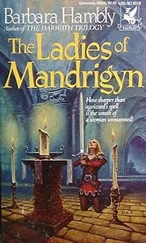And she knew, from her own experience and that of a dozen of her acquaintance, how swiftly situations could deteriorate to violence, among armed men savage with victory.
“Not the Admiral,” she replied. “To meet Jemmy.” She moved into the cavernous gloom of the Presidential Mansion’s long central hall. “And the Generals of the militia, and the members of the Cabinet, will be coming here to dine—”
“Don’t tell me you believe that newspaper pap about how the British will turn north to Baltimore.” Sophie strode to catch up. She did so easily—she and Dolley had been the two tallest girls in Hanover County and had suffered together through nicknames like “maypole” and “giraffe.” In her impatience she caught her friend’s wrist halfway to the little stair that wound its way up to the bedrooms on the second floor; beside them, one of Mr. Jefferson’s iron heating-stoves, coyly concealed behind a concrete vase, gave forth the ghostly whisper of last winter’s ashes. Through the doorway of the great oval parlor, the full-length portrait of George Washington, like a grave king in black velvet, watched them with wise and weary eyes.
“The British are angry, Dolley, and quite rightly so. After those Massachusetts imbeciles burned the Canadian Parliament buildings in York last year, they’ll not settle for sacking a lesser town.”
“Dost thou know this?” Dolley’s eyes searched her friend’s.
If Sophie read anything into the tone of her voice she didn’t show it by so much as the flicker of an eyelid. “I should be a fool if I didn’t guess.”
Dolley turned from her, and ascended the stair. And why should I think that Sophie should know? Because her father was a Loyalist? Because her family was ruined and driven out of this country, for adhering to the King?
Before he had left this morning, Jemmy himself had told her that the troops were far fewer than needed to resist invasion: twenty-five hundred from Baltimore when six thousand had been frantically requested; seven hundred from Virginia in place of the two thousand promised.
Sophie is my friend, and hath been so for forty years.
She would not betray me.
When they reached the upper hallway, Sophie’s mobile eyebrows quirked again, for here, out of the sight of whoever might come to call, hastily filled trunks lined the corridor.
“As the Arabs say, Trust in Allah, but tie up thy camel, ” Dolley told her. “I spent yesterday packing all the Cabinet papers into the carriage. Sukey is like to shake me, for there isn’t a cranny now in which to thrust so much as a rolled-up petticoat, and our gardener hath been out since dawn. He hath yet to find another cart or wagon for the rest of the State papers, and a valise of clothing. But whatever he doth find, I will not leave this house until Jemmy comes back.”
“Do you really believe you can save him?”
“I believe I can be there to care for him, if he is…” Dolley’s voice faltered at possibilities her mind wouldn’t face.
No President of the country had ever taken the battlefield as President. Sickly and subject to seizures, migraines, and debilitating rheumatism, Jemmy had not been well enough to carry a gun against the British thirty-nine years before. Now, at sixty-three…
“I can be there for him if he is taken ill,” she finished. “He is not strong.”
“Neither apparently are the men who swore they’d guard this house.” There was an edge of contempt in Sophie’s retort. “Unless they’ve concealed themselves in the trees and I simply missed seeing them. You’ll—”
She bit off her words with instinctive caution as they entered the bedroom and Dolley’s maid Sukey turned from the northeastern window, spyglass in hand. “No sign yet, ma’am.” Still handsome, though now in her sixties, Sukey had been Dolley’s first concrete intimation of the ongoing dilemma of marriage to a plantation-owner. Jemmy had presented her with the woman upon their marriage. As a Quaker born and bred, Dolley abhorred the idea of owning another woman. As a Virginia politician’s wife, it was not a sentiment she could ever make publicly known.
“I thank thee, Sukey. Not even smoke?”
The maid shook her head. “Miz Jones’s butler Lou says they got that bridge over Goose Creek heaped up with gunpowder an’ brushwood, ready to burn if’n they’s drove back.”
“Provided they can find some brave soul to go back under musket-fire and light the fuse,” Sophie commented. “They’d have done better to burn it first.”
“I told Jemmy that as well,” Dolley said. “General Armstrong hath it that to do so would impede our pursuit of them.”
“I shall be sorry indeed to miss the spectacle of veterans who held their ground at Waterloo fleeing in panic before the Virginia militia,” said Sophie drily. “Dolley, you should at least make room in the carriage for one trunk of clothing—”
“I told her that, ma’am! We may not get a chance for clean clothes, ’twixt here an’ Leesburg—”
“We shall see,” temporized Dolley, and inwardly flinched that the ultimate destination of Congress had been mentioned so casually. “I thank thee, Sukey.” She handed the maid the newspapers, took the spyglass in her hand. “Dost think thou couldst get Freeman’s son Danny to watch from the attic? ’Tis hot, I know, but ’tis a higher view—”
“Roof’d be higher,” said the maid, evidently unconcerned that Danny would fry like an egg on the roof. The butler’s twelve-year-old son was no kin of hers.
After Sukey left Dolley said, “I would sooner make room for the things that the others left here, things that belong to the country.” She turned to the window, as she had again and again since dawn. Focused the spyglass on the familiar gap in the hills where the Bladensburg road wound through toward the bridge over Goose Creek—a meager stream which Congress had renamed, with no apparent sense of irony, the Tiber.
As Sukey had said, the sky to the east was clear and empty, like pale blue china. It would ring if I tapped it with my nail.
“Did they leave things?” Behind her, Sophie’s voice was cool. “General Washington never spent a night beneath this roof, insofar as I know, and I was under the impression that everything Mr. Adams left, Mr. Jefferson had taken out with the trash.”
“I don’t mean them.” Dolley lowered the glass, but stood still gazing through the window, to the hot clear stillness of the east. “I mean Lady Washington, and Mrs. Adams. I mean things a man would not think important, perhaps. Things that are part of what they were, of what we were. Insignificant things, meaningless as the dolls and ribbons and the cups we drank from as children. We need those, as much as papers and speeches, to remember where we came from, and who we were, if our hearts are to survive.”
“I wouldn’t know about that.” The jeer in her friend’s voice brought Dolley around with a stab of remorse at having spoken her thought. In her friend’s chill eyes she saw the flames of a burning plantation-house, swarming with the shadows of looting patriot militia.
“Forgive me—”
Sophie dismissed the images with a shrug, scornful even of her own pain. And yet, thought Dolley despite herself, the coldness in Sophie’s face was to Dolley proof beyond words of the need for such dolls and ribbons and baby cups. Would she be different—would her eyes be less hard—had she had time to snatch up even one fragment of the vanishing world she had loved?
Or would her pain be only of a different kind?
Already Sophie was looking around her at the crimson silk bedroom with an appraising eye. “Did they leave things here? I don’t imagine Lady Washington did…”
Читать дальше





